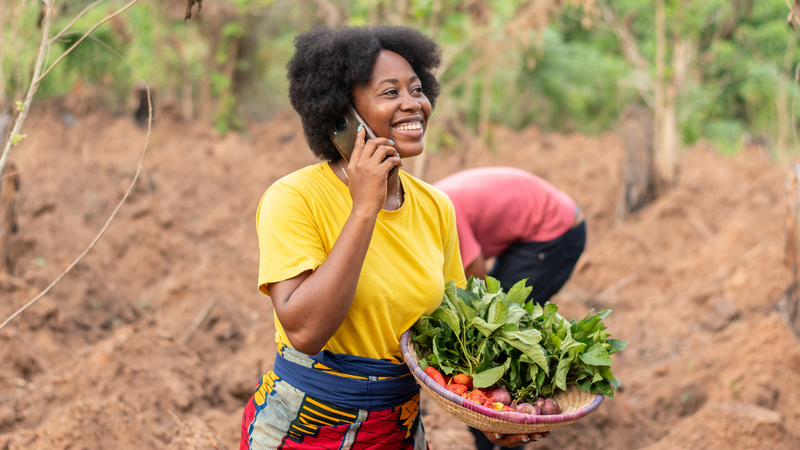Twitter space event: Youth Solutions for Food and Water Security
By Vicky Jebet and Melissa Ouya

In the face of rapid population growth and the impact of climate change on agricultural systems and water resources, the future of global food and water security is being reshaped by youth participation. As the driving forces behind transformative change and solutions, young people are at the forefront of finding innovative and sustainable solutions to critical food and water security issues. Empowered by their access to information, the younger generation is harnessing the power of technology, community engagement, and cross-disciplinary collaboration to revolutionize how we approach food production, distribution, and water management.
From advocating for policy reforms to launching grassroots initiatives and deploying digital tools for resource optimization, youth-led solutions illuminate a path toward a more resilient and nourished world. Urban farming initiatives that maximize limited spaces, mobile apps that connect surplus food with those in need, and novel purification methods ensuring safe water access are just a few examples of the impact being made by young innovators.
In preparation for the Africa Youth Climate Assembly 2023, the IGAD Climate Predictions and Applications Centre (ICPAC), in partnership with the African Union and ACCORD, is organizing an online youth campaign which provides a platform to young people in the Horn of Africa to raise their voices on climate change, peace, and security issues.
The campaign consists of Twitter Spaces events focused on three climate security themes: Youth Solutions for Food and Water Security, Climate, Conflict, Fragility, and Displacement, and Youth and Pastoralism. Following the Twitter Spaces events, a joint webinar will be held. The insights, outcomes, and resolutions from these discussions will be compiled into a declaration, which will serve as a call to action for leaders at the Africa Climate Summit.
During a recent Twitter space event on the role of youth in shaping global food and water security, our panel of experts provided valuable insights. The session was moderated by Joseph Nguthiru, the Founder of HYPAX, and featured panellists Ewura Adams Karim, Executive Director of the MALTITI Foundation; Waweru Chris Avram, Executive Council member of CYCN; Ester Malaika Aulo, Founder of EVENUS Limited; Joshua Ichor, CEO of GEOTEK Limited; and Robin Ndungu, Founder of KISUMEO Organics.
Each panellist brought their unique expertise and experiences to the conversation, highlighting the transformative contributions of young people in addressing the challenges of food and water security. They showcased innovative ideas and pioneering initiatives designed to make a tangible impact. From advocating for policy reforms to launching grassroots initiatives and utilizing technology for resource optimization, their efforts demonstrated the power of youth-led solutions. This article highlights key points from the discussion on youth solutions for food and water security, emphasizing the need for policy engagement, education and training, innovation, gender equality, and addressing food waste.
Policy Engagement and Education: Creating a regulatory framework encompassing climate action and youth involvement in agriculture is essential to provide young people with government support and legal backing. Education and training programs should also be prioritized to raise awareness and foster sustainable solutions. Innovative methods like mobile apps and USSD codes can deliver educational content to farmers, breaking down complex information into simple, and localized language.
Innovation and Technology: Utilizing the digital skills of youth can lead to innovative solutions that redefine agricultural practices. Platforms like SUPA FARM, which promotes precision farming, empower young farmers to adopt more productive and sustainable techniques. Additionally, investing in climate-smart farming practices and technologies like hydroponics and aquaponics can lead to greater resilience and efficiency in food production.
Gender Equality and Entrepreneurship: Promoting gender equality in the agricultural sector is crucial. Young women should be encouraged to pursue careers in agriculture, viewing it as an opportunity for economic growth and empowerment. Educating women on value addition and creating economic opportunities from surplus produce can help unlock the potential of female farmers. When women are empowered, entire communities thrive.
Public-Private Partnerships and Smallholder Farmers: Collaboration between smallholder farmers and organizations can enhance food security. For example, franchise models that provide training on climate-smart technologies and ensure year-round fish production have successfully created sustainable aquatic food systems. Such partnerships ensure market access and value processing chains for small farmers, securing their livelihoods while addressing food security challenges.
Minimizing Food Waste: Addressing food waste is crucial to achieving food security. Innovative solutions such as composting food waste can reduce costs and promote healthy food consumption without chemical additives. Diverse technologies, such as cold rooms for storage and food retribution systems, can ensure surplus food is preserved and distributed efficiently, reducing post-harvest losses.
Harnessing Data and Artificial Intelligence: Harnessing the power of data and artificial intelligence (AI) is instrumental in quantifying and understanding the challenges of food and water security. Governments should prioritize the development of infrastructure, policies, and technology adoption to enable accurate data collection and analysis. AI can help derive insights and guide decision-making processes for effective resource management.
Conclusion
Empowering youth for food and water security requires a multi-faceted approach that includes policy engagement, education, innovation, gender equality, and reducing food waste. By involving young minds in sustainable solutions and leveraging technology, we can nurture a generation capable of effectively addressing food and water security challenges. Collaborative efforts among governments, private sector organizations, and local communities are essential to ensure a sustainable and secure future for all.
